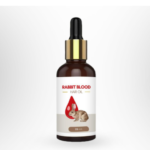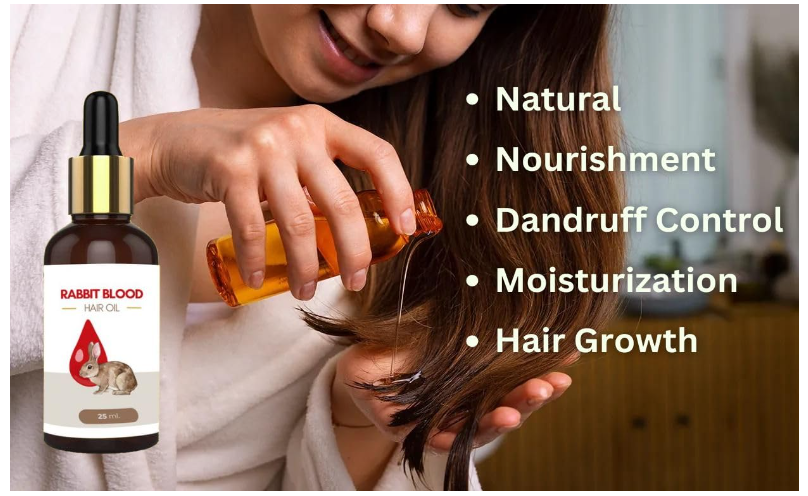If you’re looking for natural hair growth solutions, you may have come across rabbit blood oil. While less well-known, rabbit blood oil has been used traditionally in some areas, with claims that it helps increase hair strength and promote growth. But does it actually work? Is it safe to use? Here’s a closer look to see if it’s right for you.
Does Rabbit Blood Oil Help Hair Growth? An Honest Look
If you’ve been exploring natural remedies for hair growth, you might have come across rabbit blood oil as an option. While it’s lesser-known, rabbit blood oil has been used traditionally in some regions, with claims suggesting it can improve hair strength and promote growth. But does it really work, and is it safe to use? Here’s a closer look to help you decide if it’s right for you.
What is Rabbit Blood Oil?
Rabbit blood oil is a product manufactured from rabbit blood that has been processed into an oil. The oil is supposed to transport the protein and minerals found in rabbit blood, which are good to hair health. Rabbit blood oil has long been used to treat hair problems such as thinning, dryness, and brittleness in traditional cultures, particularly in Africa and the Middle East. However, the usage of this oil is contentious and not universally supported by current dermatologists.
What are the ingredients in rabbit blood hair oil?
Rabbit blood hair oil often claims to contain rabbit blood extracts as well as other natural components such as herbal oils, essential oils, and plant-derived minerals. Coconut oil, castor oil, aloe vera, amla (Indian gooseberry), and critical vitamins are all common hair-nourishing additions.
However, the specific mixture varies according to brand and product. Always read the product label for particular ingredients and make sure it satisfies your skin’s sensitivity and ethical requirements.
The Claimed Benefits of Rabbit Blood Oil
Though scientific studies on rabbit blood oil are scarce, supporters suggest that it has various potential benefits for hair growth, including:
1. Rich in protein.
Hair is mostly composed of keratin, a type of protein. Rabbit blood is said to include proteins that can thicken hair strands when administered topically. Stronger hair implies fewer breakage, which may result in thicker-looking hair over time.
2. Possible Nutrient Boost
Rabbit blood oil may also contain critical elements like amino acids, iron, and other minerals, which hair follicles require to operate properly. These nutrients are thought to nourish the scalp and create a favorable environment for hair development.
3. Moisturizing properties
The oil’s consistency is frequently noted as good for hydrating the scalp and hair, especially for people with dry or Frizzy hair booster. Keeping the scalp moisturized and balanced is essential for minimizing irritation and increasing hair condition in general.
4. Stimulates scalp circulation.
Massage rabbit blood oil into your scalp is supposed to promote blood circulation. Increased circulation can improve nutrient delivery to the follicles, potentially resulting in stronger hair growth.
What Science Says
Unfortunately, there is little scientific proof to back up the claims that rabbit blood oil promotes hair growth. Unlike other oils with recognized advantages (such as coconut oil or argan oil), rabbit blood oil lacks scientific support. There have been few studies that look at how animal blood or blood-derived products affect human hair development, and many dermatologists are skeptical of these claims.
For the time being, all evidence supporting rabbit blood oil is anecdotal in nature. While some users report increased hair thickness and strength, it is impossible to determine whether these effects are due to the oil or other variables such as regular scalp massage, overall hair care, or dietary changes.
how to prepare rabbit blood oil?
Risks and Ethical Concerns
Using rabbit blood oil creates ethical and health problems. Here’s what you should consider:
Allergic reactions.
There is a danger of allergic reactions while using any new substance on the scalp. Because rabbit blood oil is a biological product, it may induce skin sensitivities or reactions, particularly if you have sensitive skin or an underlying scalp problem.
Ethical issues
Many individuals are uneasy with the thought of using animal-derived products, particularly when blood is involved. Furthermore, there is typically little information about how the bunnies are procured or treated, which can be troubling for people who have strong ethical or environmental beliefs.
Hygiene & Safety
Because rabbit blood oil is not regulated or widely available in mainstream markets, there is no monitoring into how it is produced. If incorrectly prepared or handled, it may include germs or pollutants that can cause scalp infections.
Safer Alternatives for Hair Growth
If rabbit blood oil does not seem to be the correct choice for you, there are several other, science-backed solutions for hair growth:
- Castor oil: known for its high ricinoleic acid concentration, helps improve hair thickness and scalp health.
- Rosemary Oil: This essential oil has been examined for its ability to increase circulation and promote hair development, and it is commonly used in natural hair care. more info
- Biotin Supplements: Biotin is a popular hair, skin, and nail supplement that has been proved to promote healthy hair development, especially in people with deficiencies.
- Coconut Oil: Coconut oil is a popular cure that aids in moisture retention and scalp health, both of which are necessary for avoiding hair loss.
What does rabbit blood contain?
It is an essential biological substance made up of watery fluid, plasma, and billions of cells, the vast majority of which are red blood cells.
Final Verdict: Is Rabbit Blood Oil Worth Trying?
While rabbit blood oil may seem appealing, the lack of scientific evidence and inherent ethical considerations make it difficult to suggest for the majority of people. While it may have some anecdotal evidence, if you’re serious about increasing hair growth, you’re better off sticking with tried-and-true therapies and products that are widely considered as both safe and effective.
1. What is the use of rabbit blood?
Rabbit blood is occasionally used in traditional treatments, mostly for its reputed cooling and therapeutic effects. In folk medicine, it can be used to cure wounds or skin disorders. However, such techniques lack strong scientific proof, and vigilance should be exercised to avoid health dangers.
2.Best product for rabbit hair oil in India under . Rs.500

1. Rabbit Blood Hair Oil 25ml (Pack of 1), Herbal Blend for Hair Growth & Strength, Vegan & Cruelty-Free Formula Product Link
3. What’s the best hair oil for growth?
Rabbit blood is sometimes
The ideal hair oil for growth is determined by your hair type and specific concerns. Castor oil, coconut oil, argan oil, and rosemary essential oil are popular options for stimulating hair growth. For the best results, use products that contain few chemicals and are made from natural ingredients.
4. Which is the world’s no. 1 hair oil?
There is no widely accepted “world’s no. 1 hair oil” because tastes differ by geography and hair type. However, brands such as Parachute, Dabur, and MoroccanOil are well-known worldwide for their efficacy and quality.
5. How to grow hair faster?
To promote faster hair development, eat a balanced diet high in protein and vitamins such as biotin and zinc.
To enhance blood circulation, massage nutritious oils into your scalp on a daily basis.
Avoid using heated styling equipment and strong chemicals.
Maintain hydration and moderate stress levels.
Consistency is key for visible results.
6. What are the side effects of rabbit hair oil Punarjeevani?
Punarjeevani rabbit hair oil is said to increase hair growth and reduce hair loss. Depending on individual sensitivity, possible side effects include scalp irritation, allergic reactions, or itching. Always perform a patch test before use, and if you have any problems, see a dermatologist


Happy new year from Iowa, Winston here. I’m always watching to see what newer sites are going up and I just wanted to see if you would like an extra hand with getting some targeted traffic, Create custom AI bots to answer questions from visitors on your site or walk them through a sales process/funnel – I could even make a persona of yourself or employee to field questions about your business. I create/edit videos/images/adcopy, create/revamp/update sites, remove negative listings, the list goes on. I’ll even shoulder 90% of the costs, dedicating my time and tools that I’ve created myself and bought over the years. I’ve been doing this for over 22 years, helped thousands of people and have loved every minute of it.
There’s virtually no cost on my end to do any of this for you except for my time starting at 99 a month. I don’t mean to impose; I was just curious if I could lend a hand.
Brief history, I’ve been working from home for a couple decades now and I love helping others. I’m married, have three girls and if I can provide for them by helping you and giving back by using the tools and knowledge I’ve built and learned over the years, I can’t think of a better win-win.
It amazes me that no one else is helping others quite like I do and I’d love to show you how I can help out. So, if you need any extra help in any way, please let me know either way as I value your time and don’t want to pester you.
PS – If I didn’t mention something you might need help with just ask, I only mentioned a handful of things to keep this brief 🙂
All the best,
Winston
Cell – 1-319-435-1790
My Site (w/Live Chat) – https://cutt.ly/bec4xzTQ